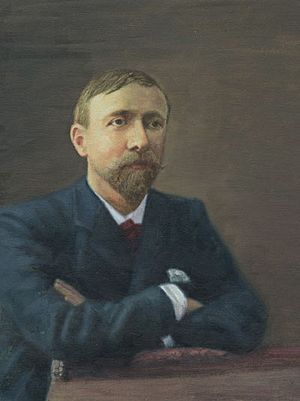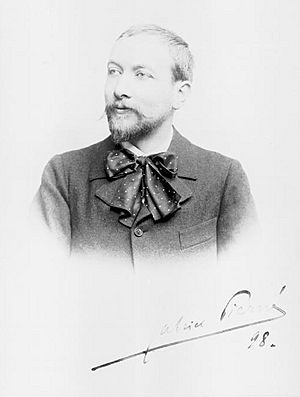Gabriel Pierné facts for kids
Henri Constant Gabriel Pierné (born August 16, 1863 – died July 17, 1937) was a French composer, conductor, pianist, and organist. He was known for his beautiful music, including operas, ballets, and pieces for orchestra.
Contents
Life Story
Gabriel Pierné was born in a city called Metz. When he was young, his family moved to Paris in 1871. This happened after Metz and part of France became part of Germany following a war called the Franco-Prussian War.
Gabriel was a very talented student. He studied at the famous Paris Conservatoire. There, he won top awards for many subjects, including piano, organ, and composition (which is how you create music). Some of his important teachers were César Franck for the organ and Jules Massenet for composing music.
In 1882, he won a special French award called the Prix de Rome for his cantata (a type of vocal music) named Edith.
After his teacher César Franck, Gabriel Pierné became the main organist at the Sainte-Clotilde Basilica in Paris. He held this job from 1890 to 1898.
Later, he became very involved with a famous concert group called the Concerts Colonne. He started working with them in 1903 and became their chief conductor in 1910. This was a very important role!
One of his most famous moments as a conductor was leading the very first performance of Igor Stravinsky's ballet The Firebird. This happened in Paris on June 25, 1910. He stayed as the chief conductor until 1933.
Gabriel Pierné also made some recordings of his music between 1928 and 1934. He conducted the L'Orchestre Colonne for these recordings. He passed away in Ploujean, France.
His Music
Gabriel Pierné wrote many different kinds of music. He composed several operas (musical plays), pieces for choirs and orchestras, and lots of chamber music (music for small groups of instruments).
One of his most well-known pieces is an oratorio (a large musical work for voices and orchestra, usually telling a story) called La Croisade des enfants. This piece was based on a book by Marcel Schwob.
He also wrote shorter, popular pieces like his March of the Little Lead Soldiers. This march was very popular and often played as an extra piece at concerts. Another popular piece is Marche des petits faunes, which comes from his ballet Cydalise et le Chèvre-pied.
His piece Introduction et variations sur une ronde populaire for saxophone quartet is a standard piece that saxophone quartets often play.
Awards and Recognition
Gabriel Pierné received many honors for his musical achievements.
In 1925, he became a member of the Academie des Beaux Arts. This is a very respected group in France that recognizes talented artists. In 1935, he was given a high honor called Commandeur de la Légion d'Honneur.
After he died, he was buried at Père Lachaise Cemetery. His tombstone was designed by a sculptor named Henri Bouchard. There is also a square in Paris named Square Gabriel Pierné, honoring his memory.
Selected Musical Works
Here are some of the musical pieces Gabriel Pierné composed:
Orchestra Music
- Serenade for Strings
- Trois pièces formant suite de concert, 1883
- Suite No. 1, 1883
- Fantaisie-ballet, for piano and orchestra, 1885
- Piano concerto, Op. 12, 1886
- Scherzo-caprice, for piano and orchestra, 1890
- Ballet de cour, 1901
- Concertstück, for harp and orchestra, 1903
- Poème symphonique, for piano and orchestra, 1903
- Two suites from the incidental music for Ramuntcho, 1910
- Paysages franciscains, Op. 43, 1920
- Fantaisie basque, for violin and orchestra, 1927
- Divertissement sur un thème pastoral, Op. 49, 1932
- Gulliver au pays de Lilliput, 1935
- Viennoise, suite, Op. 49bis, 1935
Music for Bands
- Marche des petits soldats de plomb (March of the Little Lead Soldiers), 1887
- Marche solennelle, 1899
- Petit Gavotte et Farandole
- Ramuntcho (also for orchestra), (published 1908)
Operas (Musical Plays)
- La Coupe enchantée, 1895
- Vendée (Lyric Drama), 1897
- La Fille de Tabarin (Comic Opera), 1901
- On ne badine pas avec l'amour (Comic Opera), 1910
- Sophie Arnould (Comic Opera), 1927
- Fragonard, 1934
Ballets (Dance Stories)
- Le Collier de Saphir, 1891
- Les Joyeuses commères de Paris, 1892
- Izéÿl, 1894
- Bouton-d'or, 1895
- Salome, 1895
- Cydalise et le Chèvre-pied, 1923
- Impressions de music-hall, 1927
- Giration, 1934
- Images, 1935
Music for Theatre Shows
- Yanthis, 1894
- La Princesse Lointaine, 1895
- La Samaritaine, 1897
- Francesca da Rimini, 1902
- Ramuntcho, 1908
- Les Cathédrales, 1915
Chamber Music (for Small Groups)
- Sonata in D minor, Op. 36 (violin or flute and piano), 1900
- Piano Quintet, Op. 41 (2 violins, viola, cello and piano), 1917
- Trio in C minor, Op. 45 (violin, cello and piano), 1920–21
- Sonata in F sharp minor, Op 46 (cello and piano), 1922
- Sonata da camera, Op.48 (flute, cello and piano), 1926
Piano Music
- Étude de concert in C minor, Op. 13, 1887
- Album pour mes petits amis, Op. 14, (published 1887)
Solo Instrument Pieces
- Serenade, Op. 7 (violin and piano), 1881
- Impromptu-Caprice, Op. 9 (harp), (published circa 1901)
- Piece in G minor (oboe), 1883
- Solo de concert (bassoon and piano), 1898
- Canzonetta, Op. 19 (clarinet and piano), 1888
- Trois pièces Op. 29 (organ), (published circa 1892)
Choral Music (for Choirs)
- L'An Mil, (published 1898)
- no. 1. Miserere Mei
- no. 2. Fete Des Fous Et de L'ane
- no. 3. Te Deum
- Les Cathédrales, 1915
- no. 1. Prélude des cathédrales
- no. 3. Chanson Picarde
- no. 7. Épisode des églises
- no. 8. Épisode des Flandres
Songs
- 6 Ballades françaises de Paul Fort, (circa 1920)
- No. 1, La Vie
- No. 2, La Baleines
- No. 3, Complainte des Arches de Noé
- No. 4, Le petit rentier
- No. 5, Les dernières pensées
- No. 6, La Ronde autour du monde
- Deux mélodies
- Découragement
- À Saint Blaise
- Poèmes de Jean Lorrain
- no. 1. Le Beau Pirate
- no. 2. Les Petites Ophélies
- no. 3. Les Petits Elfes
- no. 4. Une belle est dans la forêt
- no. 5. Ils étaient trois petits chats blancs
- Soirs de Jadis
- no. 1. La princesse au bord du ruisseau
- no. 2. Ils s'aimaient
- no. 3. Ce qui frappa ses yeux d'abord
- no. 4. Le soir tombe sur la rivière
- Trois adaptations musicales sur des vers
- no. 1. La marjolaine
- no. 2. Nuit divine
- no. 3. Noël
See also
 In Spanish: Gabriel Pierné para niños
In Spanish: Gabriel Pierné para niños



